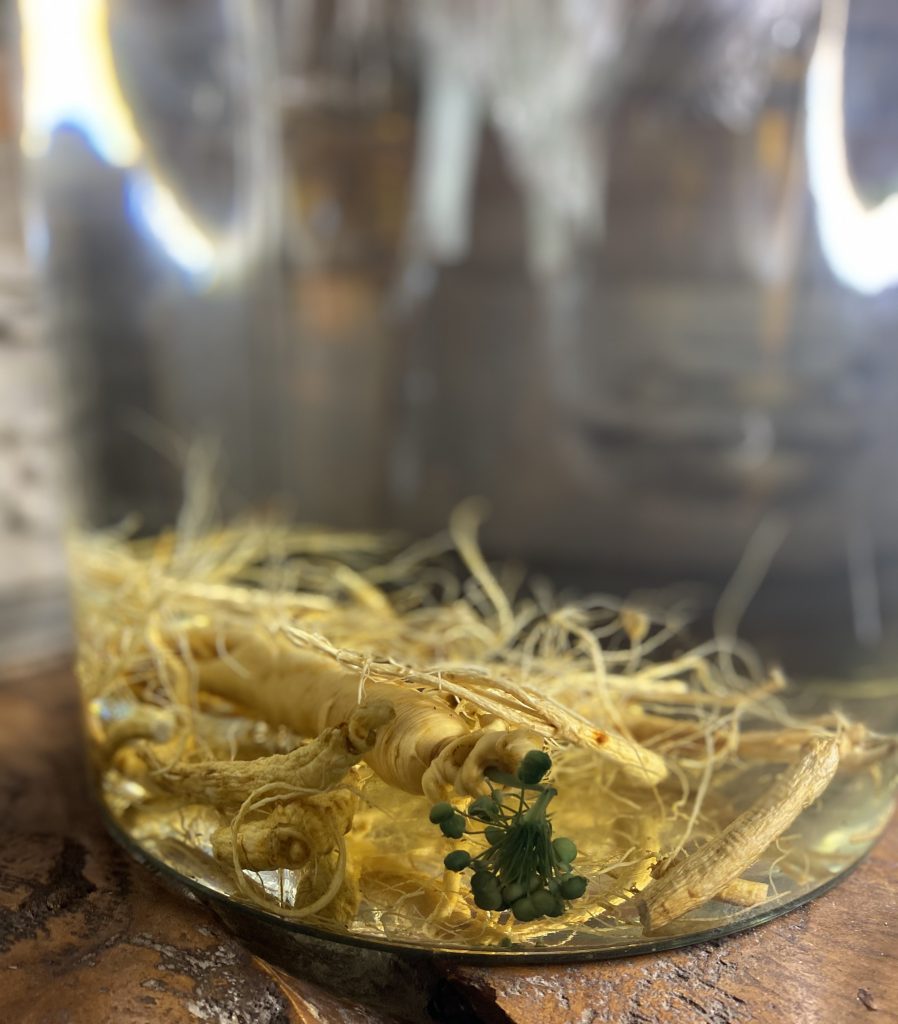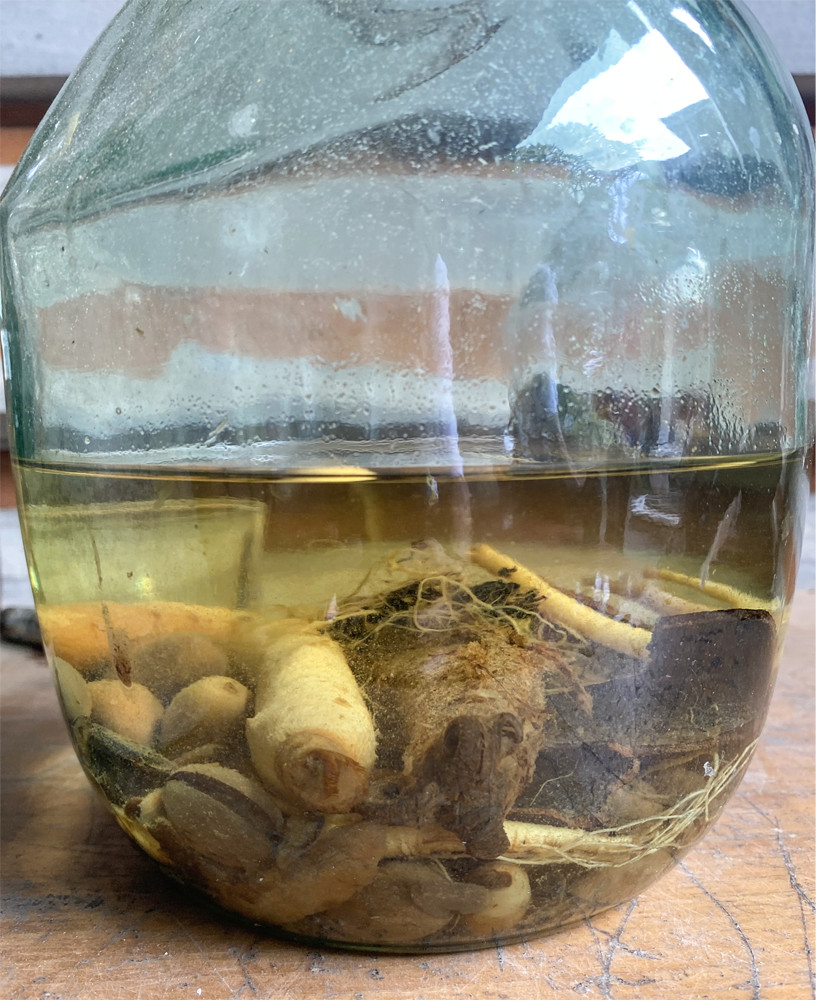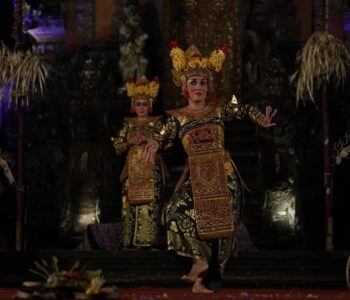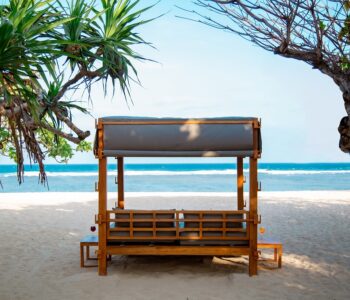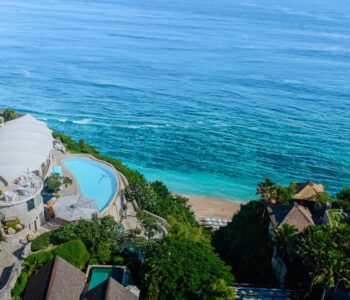Earlier this year, the Balinese governor endorsed the daily intake of arak to free asymptomatic carriers from the coronavirus. Whilst it can be misleading to claim the local spirit is some sort of cure, ‘arak therapy’ has been a form of traditional medicine practised for centuries in Bali.
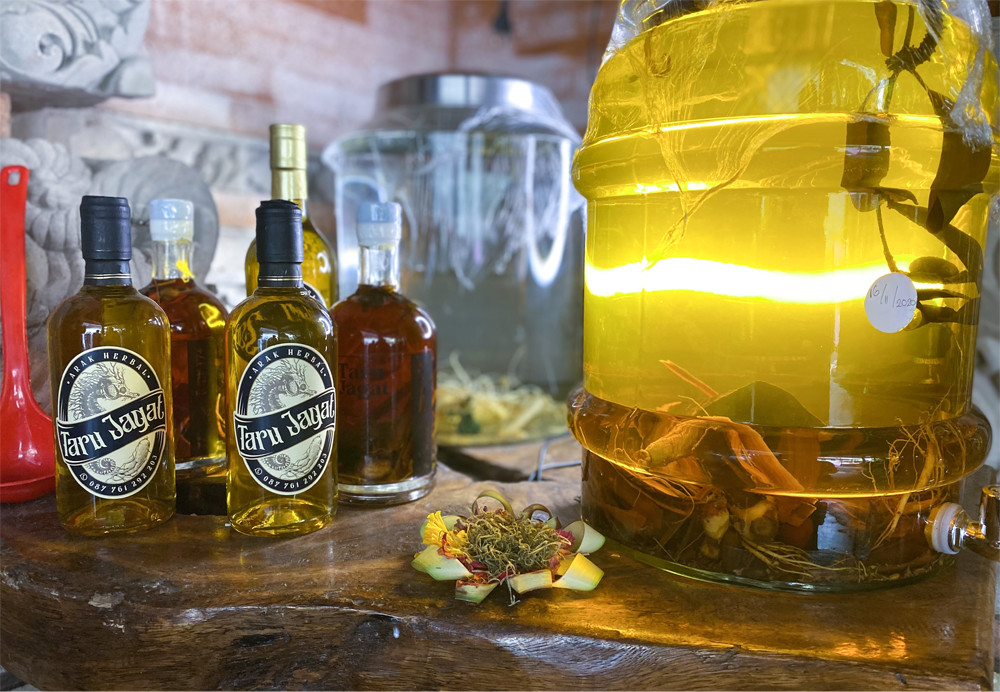
The sight of reused waterbottles containing vodka-esque arak, for some of us, might bring a sour flavour in the mouth, or memories of shameful nights having indulged in this local ‘moonshine’. For two brothers however, arak inspires in them of teachings of traditional medicine honoured by their forefathers and a reminder to keep its consumption in this positive light.
If you scan around a traditional Balinese household, you may find a dusty old demijohn or two filled with arak. Sitting at the bottom of the glass drum are a cluster of wild plants, rare roots, herbs, and nuts; infused in the liquid for years and years. This is what is called arak jung, or herbal arak. Unlike the elixirs packaged in plastic bottles for fast (and often hedonistic) consumption, the ones at home are purposely preserved long enough to be part of the furniture. The custom involves downing a sloki (shot) a day for good health, and refilling it with fresh arak overtime in hopes that later generations will inherit the very same bottle and continue the ritual.
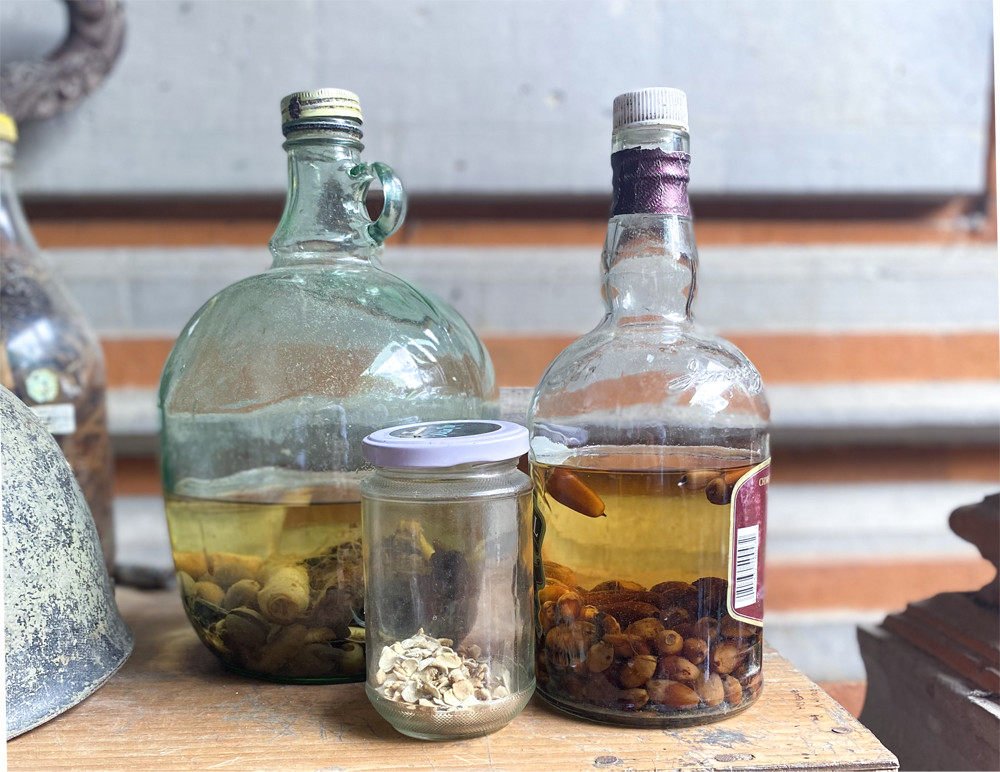
Arak means ‘perspiration’ in Arabic, and has been imbibed as a recreational drink as early as the 18th century when imperialists conquered parts of Asia. Allegedly, the East India Company had terrible troubles restraining their men going on arak binges in India.
In Bali, however, arak is a key component in offerings which eventually became a large part of family traditions in the household. Legend has it that arak’s new daily role branched out of the spiritual root when temperatures in Bali were so low that the lower regencies became blanketed in fog, as one would find in the high altitudes of Kintamani.
To keep themselves warm at night, men would make arak jung (the ‘herbal arak’) and later learned that it granted them energy and good health. Swearing by its wonders to the immune system, they deemed it usada or obat (medicine) in Bahasa Indonesia. Arak became a staple drink, distilled from the sap of coconut palms, to weather the cold as well as a daily dose of antioxidants, vitamins, and minerals.
A shot a day keeps the doctors away
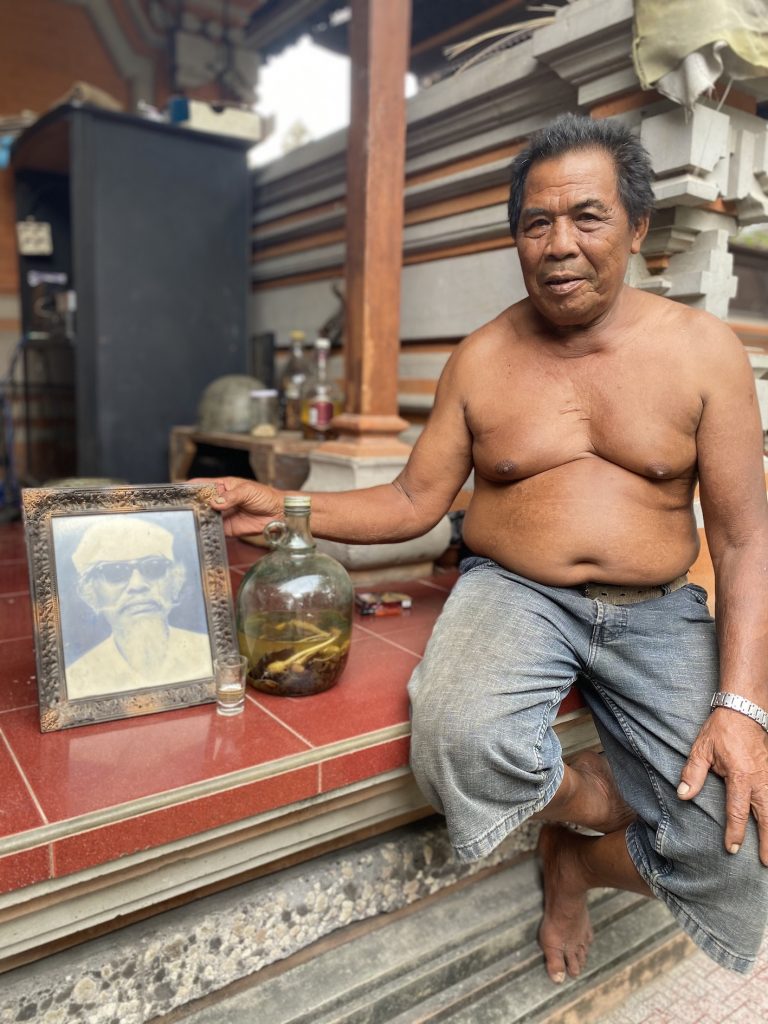
Coming across arak jung in modern day Bali made brothers Gus De and Gus Eka reminisce about their great grandfather, a Balinese healer who, intrigued by ancient remedies, studied and practised arak therapy through lontar manuscripts. Along with his chemist companion, the two men perfected a concoction of arak jung with optimum taste and health benefits that it was sought-after not only by neighbours and families but also by members of the Ubud royal family seeking to cure their ailments.
Gus De and Gus Eka are stepping in to continue the tradition, working alongside Made Logi, who foraged for ingredients in the wild and brewed the elixirs back in the day. They produce and distribute mainly to the young masses under their own brand called Taru Jagat, to spread ancestral knowledge and essentially redeem arak’s good name. Locally, Made is now known as the 75-year-old pekak (grandfather) with little to no strands of grey hair on his head — he owes it to the shot he swigs every night for the past five decades.
With this ancient study as its heart and soul, Taru Jagat brews arak jung with modern influences to cater to the youth, but they steer clear from drawing drinkers with cheap flavours (infused sugars and syrups) or those hoping to consume it for fun. They hope to shift the image of arak as a ‘recreational’ drink to a narrative that surrounds its many health benefits.
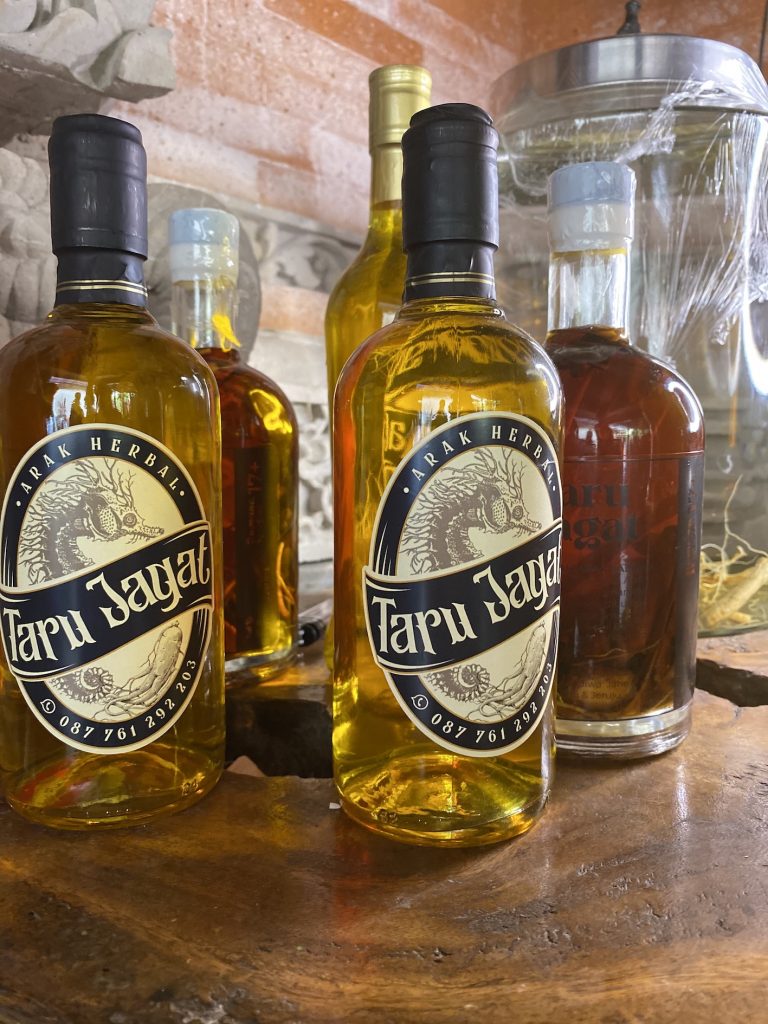
“There is another side to arak,” Gus Eka shares, “but everything boils down to self-control.” He believes some people use it as a bridge to open discussions and facilitate the exchange of ideas, whilst it lets loose the demons in others. “We often see how it can magnify bad intentions and behaviours. We want to spread the message that it can be used for good.”
Taru Jagat translated from Balinese means ‘trees from the universe’; and each bottle they sell is brimful of nutrients from plants.
Ginseng is a potent antioxidant and known to help improve brain function, lower blood sugar, fight fatigue and boost energy levels. The Eurycoma longifolia plant, locally known as pasak bumi, is a popular aphrodisiac that can treat erectile dysfunction, stabilise testosterone levels, whilst reducing stress. The highly nutritious dates are also included in the mix; they are high in fibre and disease-fighting antioxidants, and promote brain health. Indian redwood (Biancaea sappan) or kayu secang is known to treat blood-related issues, skin infections, helps cure sore throat and fevers. The seahorse, though unusual and certainly off-putting to some, is a staple powerhouse in Chinese medicine for ameliorating fatigue and used to treat impotence, wheezing (respiratory problems), and nocturnal enuresis — and one study found bio activities in the animal that offer anti-tumour properties.
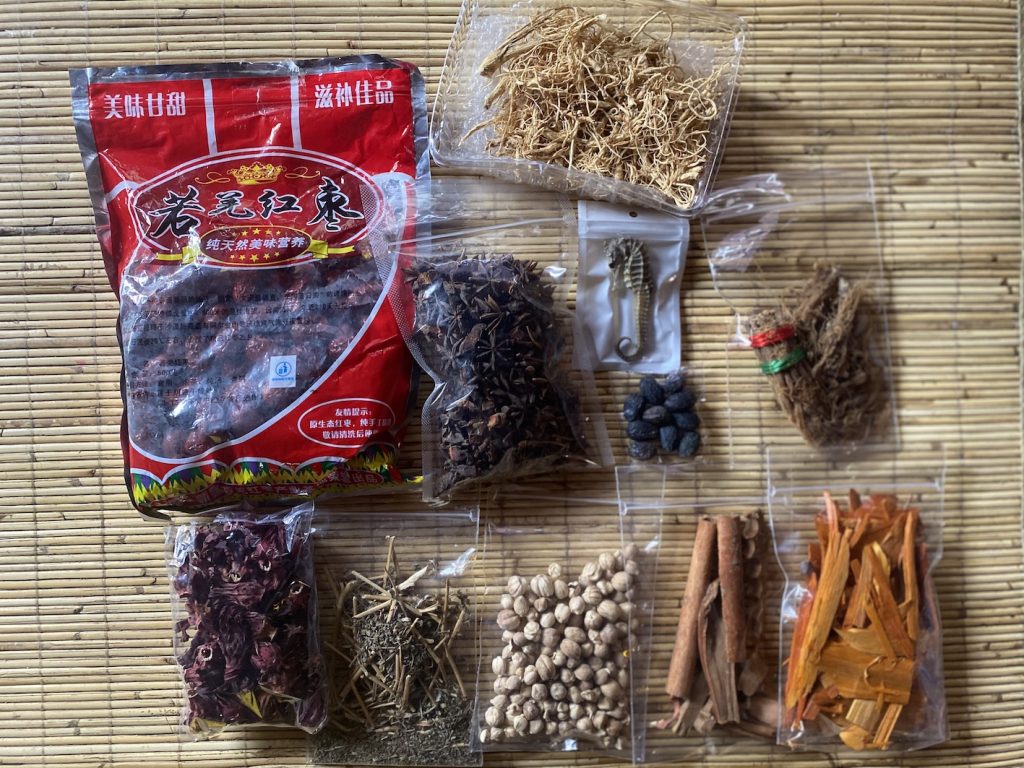
“Turns out, the philosophy of arak as medicine is prevalent. When I look closely, I can easily spot a bottle of arak jung in almost every household in Bali that has been around for decades,” says Gus De, pointing to Made Logi’s antique carboy holding five decades worth of arak and herbs. We cheered to him and incredulously agreed it went down as smoothly as a finely aged scotch.
Find out more about this herbal arak here:
Call: 087761292203
Instagram: @taru_jagat

